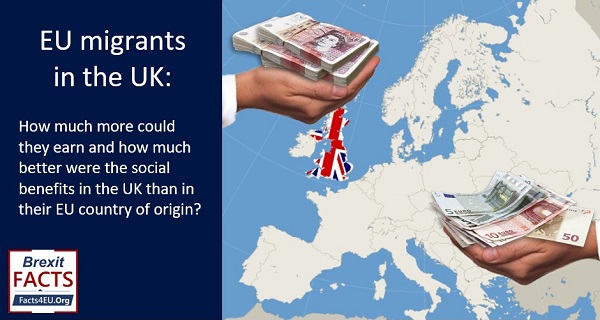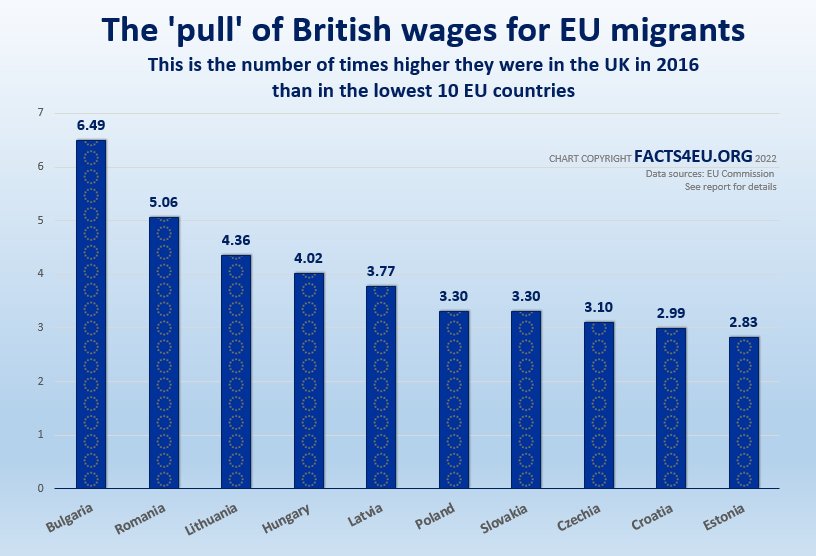When we voted Leave, the average wage in the UK was 6.5 times that in Bulgaria
Is it any wonder 6.9 million EU citizens applied to make Brexit Britain their home?

Montage © Facts4EU.Org 2022
Facts4EU.Org analyses the official numbers of EU migrants and why they came
A four-part Facts4EU.Org and CIBUK.Org investigation into
who came to the UK legally from the EU – and why
- Part One – Where did the 6.9 million legal EU migrants come from [Yesterday]
- Part Two – How much more could they earn in the UK than in their EU country of origin? [TODAY]
- Part Three – Unemployment : How much better were job prospects in the UK than in the EU?
- Part Four – Home Office still approves more EU migrants PER MONTH than illegal boat migrants all year to date
In this four-part landmark report, we provide the official facts
In June 2016 the British people took part in the largest democratic vote in British electoral history – and chose to leave the European Union. Yesterday we looked at the six million EU27 migrants who had chosen the UK as their home. Today we provide some data on why these EU migrants might have made this choice.
We are focusing mainly on the economic drivers – pounds in the pocket – although of course there were other factors, some of which we touch upon today.
The truth about the EU’s ‘Freedom of Movement’ and what it meant to the British people
In this four-part series, Facts4EU.Org unravels the facts for readers. How many EU migrants came and from which countries? How much better were the wages in the UK than back home? And how much better were the job prospects? And finally we ask how it's possible that half a million more have applied this year?
Part Two – How much better were the wages and social benefits in the UK than back home?
Facts4EU.Org has analysed the average earnings in the 28 countries of the EU in 2016, using the EU Commission’s own official data. Below we show the 10 EU countries with the lowest average earnings and compare these to the UK.
We then go on to look at other possible ‘pull factors’ for the 6+ million EU migrants who applied to make the UK their home.
Brexit Facts4EU.Org Summary
In 2016 the average Bulgarian earned 6.5 times more in the UK than back home
UK average earnings – how many times greater than in their home country
- Bulgaria : 6.49
- Romania : 5.06
- Lithuania : 4.36
- Hungary : 4.02
- Latvia : 3.77
- Poland : 3.30
- Slovakia : 3.30
- Czechia : 3.10
- Croatia : 2.99
- Estonia : 2.83
[Source : EU Commission’s official statistics agency Eurostat. The data is for direct remuneration, plus any bonuses and allowances, in companies employing 10 people or more, excluding those working in public services. Euros were converted into Pounds at the average rate prevailing in 2016.]
© Brexit Facts4EU.Org 2022 - click to enlarge
“Aha!” cry Rejoiners, “But the cost of living in countries like Bulgaria was so much less!”
This is true but it misses a fundamental point. Many EU workers in the UK send money home. Proportionate to their income the amounts they send are worth more in their home countries, so they get an extra benefit.
Then there are other financial benefits. For example it is possible for an EU migrant to claim UK child allowances for his or her children back home and to have this money paid there.
For those still not satisfied, we also reviewed the data for wages adjusted for 'purchasing power'. This still showed EU27 workers were significantly better off in the United Kingdom.
The social benefits to EU migrants and the social costs to the indigenous population
In most of the EU, healthcare attracts a cost through private insurance. In the UK, the NHS provides this free at the point of delivery.
EU migrants are naturally entitled to all other benefits too, such as dentists, schools, housing, and all other local services. Taking on over six million migrants from the EU has of course had an impact on the delivery of these services which have simply not been able to keep up with demand.
Finally we come to ‘productivity’
In recent years the economic growth which is supposed to be delivered by increases in productivity has slowed to a crawl.
Many economic commentators now accept that the plentiful supply of cheap EU27 labour has contributed significantly to this lack in improvements in productivity. Why should companies invest in new plant and machinery when they can simply take on more cheap labour when they want to increase output?
Facts4EU.Org and CIBUK.Org asked the Rt Hon Sir John Redwood MP for his thoughts
Either read Sir John’s comments below or click on the 60-second video clip to watch him as he talks to us.
“I don't like the ‘import migrants to do low paid jobs’ model. I have two problems with it. One is it's a very expensive model for the state. It may well be cheap for the employer, but I'm trying to get the state to understand the huge costs involved in someone coming into a low paid job because they will often need the provision of social housing. They may need school places for children if they come as a family and they will certainly need healthcare.
“And then of course they will need all kinds of extra utility provision. And as we are adding half a million additional people every year, and as we're tending to concentrate them in the areas of the country that are already very hard pressed and all those people need extra capacity, there is a big capital cost to putting in the extra wires, cables, pipes, production of energy, road space, and all the other things you need. Because you you are effectively trying to add a city the size of Portsmouth every year to the country….
“So I think we need to be bolder and to switch off quite a lot of the supply of legal low cost migration into the country. And we need to throttle back as completely as possible at the illegal entrants, which should not be given four-star hotel accommodation in the way they are at the moment.”
- The Rt Hon Sir John Redwood MP in an exclusive interview for Facts4EU and CIBUK.
Observations
The EU27 migrants themselves are not to blame for any of the above at all, naturally
They didn’t make the rules and no-one can criticise them for taking full advantage of these. They saw an opportunity to improve their lives and they took it.
The blame for all of this lies with the UK’s membership of the EU and with the UK government for not negotiating better and not clamping down on the excesses.
In the third part of this EU migrants series we will look at another key ‘pull factor’ which made the UK such an attractive option for the EU’s millions: having a job at all. We will reveal just how bad unemployment has been in the EU, compared to the United Kingdom.
We must get reports like this out there
Reports like the one above take far longer to research, write and produce than many people realise. If they were easy, readers would see other organisations also producing these daily.
However, there’s little point in the Facts4EU.Org team working long hours, seven days-a-week, if we lack the resources to promote them effectively – to the public, to MPs, and to the media. This is where you come in, dear reader.
Facts4EU.Org needs you today
We are a 'not for profit' team (we make a loss) and any payment goes towards the actual work, not plush London offices, lunch or taxi expenses, or other luxuries of some organisations.
We badly need more of our thousands of readers to become members, to support this work. Could this be you, today? It's quick and easy, we give you a choice of two highly secure payment providers, and we do NOT ask you for further support if you pay once. We just hope you keep supporting us. Your membership stays anonymous unless you tell us otherwise.
Please don't assume that other people will keep us going - we don't receive enough to survive and we need your help today. Could you help us? We rely 100% on public contributions from readers like you.
If you believe in a fully-free, independent, and sovereign United Kingdom, please join now by clicking on one of the links below or you can use our Support page here. You will receive a personal, friendly ‘thank you’ from a member of our team within 24 hours. Thank you.
[ Sources: EU Commission’s official statistics agency Eurostat | Rt Hon Sir John Redwood MP ] Politicians and journalists can contact us for details, as ever.
Brexit Facts4EU.Org, Sun 18 Dec 2022
Click here to go to our news headlines
Please scroll down to COMMENT on the above article.
And don't forget to actually post your message after you have previewed it!
Since before the EU Referendum, Brexit Facts4EU.Org
has been the most prolific researcher and publisher of Brexit facts in the world.
Supported by MPs, MEPs, & other groups, our work has impact.
We think facts matter. Please donate today, so that we can continue to ensure a clean Brexit is finally delivered.
Paypal Users Only - Choose amount first
Quick One-off
Monthly




Something to say about this? Scroll down for reader comments